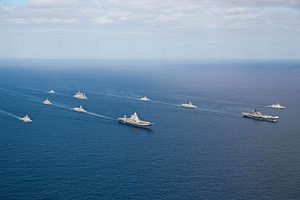The Indian Ocean Naval Symposium (IONS) will be celebrating its 10th anniversary this week at Kochi, India. Primarily created as an open and inclusive forum for the navies of the Indian Ocean states to initiate discussion and cooperation on regionally relevant maritime security issues, the event will be organized on the theme of SAGAR (Security and Growth for All in the Region), an acronym coined by Indian Prime Minister Narendra Modi. The idea not only puts the Indian Ocean Region (IOR) as a top priority for New Delhi’s security and economic prosperity, but also seeks to project India as a benign maritime power initiating multilateralism and inclusivity in the region.
With the growing strategic importance of the region alongside India’s great power ambitions, the landmark of the gradually growing organization puts forward a significant question. Can IONS be India’s vehicle for realizing its ambitions in the Indian Ocean Region (IOR)?
Launched in 2008, under the aegis of the Indian Navy, IONS fits into India’s three-fold ambitions in the region: strengthening and deepening the relations with the Indian Ocean littoral states; establishing its leadership potential and aspirations of being a net-security provider; and fulfilling India’s vision of a rules-based and stable maritime order in the IOR.
Consisting of 32 nations, including eight observer states, grouped into four categories, the wide and inclusive membership of IONS provides India with a platform that can be used to reach out to a range of IOR states and at the same time strengthen and deepen its existing partnerships in the region. As India seeks to consolidate its sphere of influence from the Straits of Malacca to Hormuz, a platform like IONS would ensure that India has the scope to cooperate with the littoral states on issues of maritime security and awareness in the region. Being a technical forum with a broad membership, unlike the politically driven Quad, India can use IONS to unite the regional states on shared principles and strategies without antagonising any state at the cost of block politics. IONS’ productivity as a non-controversial platform for the management of security issues in the region has been further advanced by the jointly held Search and Rescue naval drill by India and China at the height of the Doklam crisis, under the aegis of the Bangladesh Navy.
Second, as India punches above its weight and seeks to counter-balance the increasing presence of China alongside owning more responsibilities in the region, IONS can help India to project itself as a net-security provider. This idea also emanates from a legacy that the Indian Ocean is the natural theatre for the Indian Navy and it should, by the virtue of its history and geographic centrality, enjoy a primacy. Time and again, India has claimed to seat itself as the first-responder for the regional states in times of crisis assuming strategic responsibilities. To its credit, India has showcased its potential in Humanitarian and Disaster Relief (HADR) previously during the 2004 tsunami and 2008 Cyclone Nargis. However, India is yet to showcase any leadership potential at a multilateral level. Proactive military diplomacy through the platform would provide India an opportunity to match its rhetoric with delivery.
Third, IONS can be a facilitator for India’s vision of a rules-based maritime order in the region. While India’s security apprehensions partly arise due to a growing Chinese footprint in the region, it also encapsulates protection of its vital sea lines of communication from maritime terrorism and piracy. A rules-based maritime order can be advanced through a body like IONS in two ways. First, the platform can regularise maritime activities and take steps toward institutionalizing them. This would gradually instil confidence among the states in terms of holding Coordinated Patrols (CORPAT), Maritime Interdiction Operations, Search and Rescue Operations, in turn enhancing the interoperability of forces. Second, India should normatively project the idea of a naval community in the region that harps on inclusivity and coordination in order to deal with common risks and threats. With IONS’ broad membership, India can ensure that no one power dominates in the region endangering the balance of power in IOR.
As India turns gradually more to the sea, its strategies and policies should be more carefully and closely watched in the region. While IONS provides multiple possibilities of showcasing and fulfilling India’s ambitions in the region, it also suffers from lack of coordination and sufficient political will. The security dynamics of the Indian Ocean would also stand in the way of India and its ambitions being pushed through a multilateral domain. First, the presence of extra-regional powers in the region hold the key to alter the balance of power in the region. Second, the IOR is a vast and diverse expanse where the states differ in capabilities and vision. As there are a host of exclusive regional and inter-regional arrangements already present, India needs to chart out a role and purpose for IONS in absence of which it can turn into a powerless club. Third, India’s own interests in the region are more than often not pursued through a multilateral approach but a bilateral or trilateral approach.
Multilateral initiatives like IONS may be relegated to diplomatic niceties, but they can be an enabling factor in India’s roadmap for IOR in areas of institution building, agenda-setting and power projection, without which India’s IOR ambitions would ring hollow. IONS can be India’s platform to showcase that India can be an effective and benign power in the region with diplomatic potential and might along with bringing a structural change that has the possibility of ensuring stability for the Asian balance of power.
Udayan Das is a doctoral candidate at the Department of International Relations, Jadavpur University, India.

































